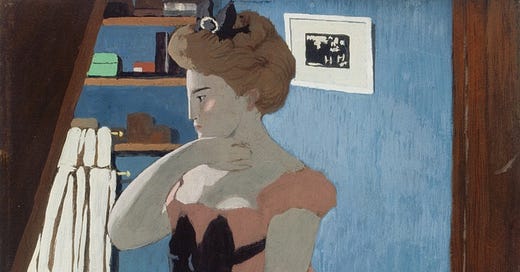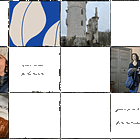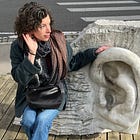Bonjour! Did you know that if you click the heart ❤️ at the top or bottom of this email it will help others discover idiomatic? It’ll also make me smile!
Rebonjour! (Hello again!) Thanks for reading idiomatic. While I try to make each issue accessible to new readers, it is a linear story. You can totally continue reading, but if you’d like some additional context, check out the previous issue ⬇️ or even the table of contents. Ok, c’est parti!
april, 2022
durango, colorado
From my bedroom window, I watch springtime bud in the Rockies. Snow continues to fall, but it’s a heavy, slushy affair. It melts quickly, revealing a fresh batch of cheerful young leaves. I’m spending more time than usual inside, recovering from meniscus surgery. To make the best of the situation, I’ve embarked on a 5-week French intensive with my teacher, Yann.
By now, I’ve surpassed my previous knowledge of the language and found myself on rocky terrain. It’s like the map has been ripped from my hands. I get lost in my own sentences, suddenly overwhelmed by que’s and quelle’s and ce’s and ce que’s, and little rules that suddenly change the conjugation of a verb.
Even still, I can tell that I’m making progress. In fact, the challenge has developed a certain je ne sais quoi. It’s like French is playing hard to get. I start making an extra effort with my makeup and hair—a habit my coworkers begin to notice. One of them has dubbed my French lessons “a little bit of Ouh là là.”
One day, Yann and I are discussing the philosophical differences between the two primary forms of past tense.
Ok, that’s not true. I’m discussing the philosophical origin of French verb tenses, searching for logic that will help me remember which one to use. Yann is trying to convince me that French grammar has no deep, hidden meaning about life.
Anyway, this inevitably leads to a disagreement about the semantics of falling in love. I’m describing a TV show I recently watched.
“Elle tombait amoureuse,” I say. She fell in love, gradually over time, using l’imparfait. Like Elizabeth Bennet and Mr. Darcy.
"Non, elle est tombée amoureuse," Yann corrects me. “You have to use the passé composé to describe falling in love.” In French, falling in love is a singular action, like getting hit by a bus.
“Mais pourquoi?” But why?
"Because falling in love is something that happens at once, so it must be passé composé.”
“I don’t know,” I counter. “Couldn’t it be l’imparfait because it’s something that just kind of grows the longer you know someone?”
“Non, it happens once and then you are in love.”
Tell that to Jane Austen. I make a note to read more French literature.
novembre, 2022
paris, france
Fall arrived on the 1st of November, a moody visitor to the languid days of a late summer. It carried a wet wind under its arm and wore a mischievous grin. Overnight, the ambling paths of the Jardin du Luxembourg were stamped with wet leaves. Rain rippled like pebbles dropped into the Seine. And along the busy sidewalks, umbrellas bobbed up and down like apples in a river.
I’ve just landed in Paris and plan to pass the next three months in France. My entrepreneurial friends have dubbed this a pilot program; a trial run to determine if this long-repressed dream of living abroad is a viable life goal. It’s not like I want to live on the moon, I remind myself; but I think for some, moving abroad isn’t that far off.
My furniture, books, and camping gear have been packed into storage; my apartment sublet to a recent grad; and Roxy boarded with a cat-sitter whose new kitten has fallen desperately in love with her. (A singular action, occurring the moment they met.) My friends even threw me a going away party, evidence that they, at least, think this trial run will be successful.
Three months isn’t that long, so I’ve decided the best way to get a sense of “real life” is to make friends. There’s a writing group in Paris, a language exchange, several climbing gyms, and a co-working space—all of which I have grand intentions of joining. I’ve been setup with mutual friends and we’ve made dates to meet up for un verre of wine. But the meeting I’m most anticipating is with my French teacher, Yann.
We agree to meet at the Musée d’Orsay in a week. This allows me ample time to wind myself into a complete ball of anxiety. What will we talk about? Which language will we speak? What will I wear? What will he wear? What if he doesn’t have legs? I realize now that I’ve never seen more than his upper torso. There are numerous concerns.
I decide that I can’t meet him without first buying a new pair of jeans. You’d think shopping for an outfit in Paris would be easy—I mean, it’s Paris—but attractiveness and affordability are mutually exclusive in this great city. My quest takes me from one end of Paris to the other. Back and forth across the Seine. From the wide, tree-lined boulevards of the 17th to the winding passages of the 5th. I walk more than 8 miles per day.
By the end of the week, I’ve found the perfect pair of jeans. They look great, but not too great. After all, I don’t want to seem as if I’m trying. But when I weigh myself later that day—who puts a scale in an Airbnb? —I’m startled to discover that I’ve lost considerable weight. These sexy new jeans will never fit once I stop thru-hiking Paris every day. I return them and wear my same old pair when I meet Yann on Saturday.
It’s raining and all of Paris has decided this is a good day to visit the Monets—or is it the Manets? —as well. I join the back of a long queue as I wait for Yann.
I’m a punctual person. As my granddad used to say, “If you’re not early, you’re late.” When I’m anxious, however, I tend to arrive orders of magnitude early. Like, you could drink multiple espressos and still have time to doom scroll on Instagram while waiting.
Unfortunately, lateness is kind of a thing with the French. They even have a saying for it: le quart d’heure de politesse. Fifteen minutes of polite lateness. Yann respects this rule.
As a result of math, I’ve now been standing in the rain for more than 30 minutes, damp and frizzy. My jeans are wet. I’m still wondering which language we’ll speak, when I remember the bisous—the French kissy face greeting. Oh God, which way does it go? Do we kiss the right cheek first or left? What if I accidentally kiss him? I have to look this up immediately.
It’s as I’m juggling my phone with one hand and holding my umbrella with the other, that I see Yann. He waves and cuts the line, joining me under the umbrella.
“Bonjour,” he says.
“Bonjour.”
Up next on idiomatic:
Merci for reading! If you enjoyed this petite histoire, why not share it with a friend? There are more adventures in Paris and beyond to come.
If this is your first time here, maybe I should’ve introduced myself before sharing a weird personal story. As you’ve probably gathered by now, I’m a recent expat who writes about how learning French inspired a shift in alignment and life goals. You can read more about idiomatic here, and get caught up with previous episodes below. Until next time, au revoir!













I HATE that feeling, of not knowing how to greet someone. Fun fact: my husband accidentally kissed our guy friend because he STILL doesn't understand the double kiss thing. HA!
I want to know more!! What happens next?
Gerry Manning a raison, c’est un travail d'écriture complètement ravissant!.
Je suis curieuse, Combien de bises avez vous fait ? Parce que apparemment c’est différent selon où vous êtes situé.